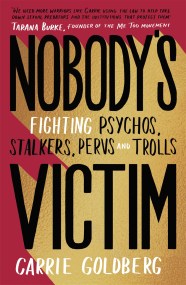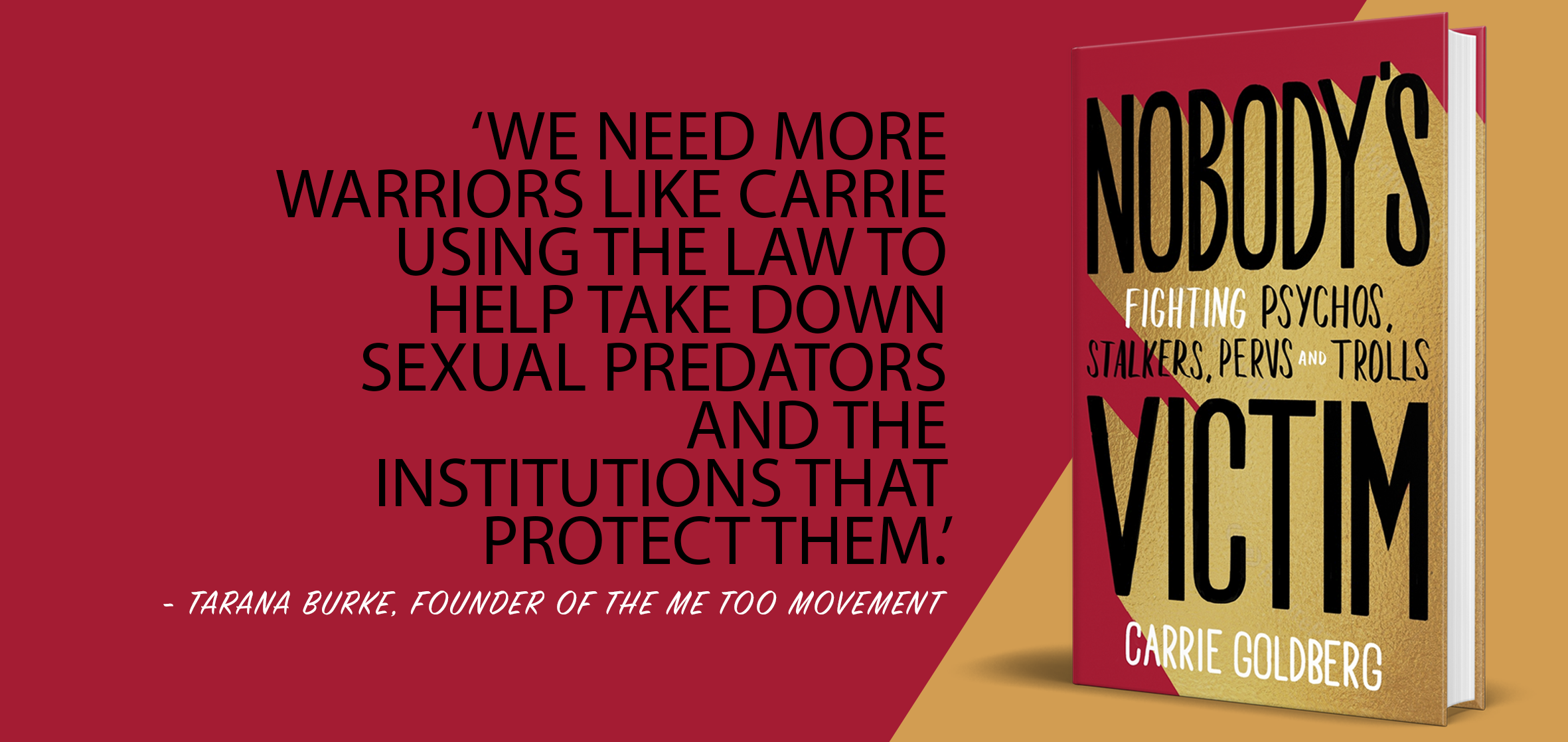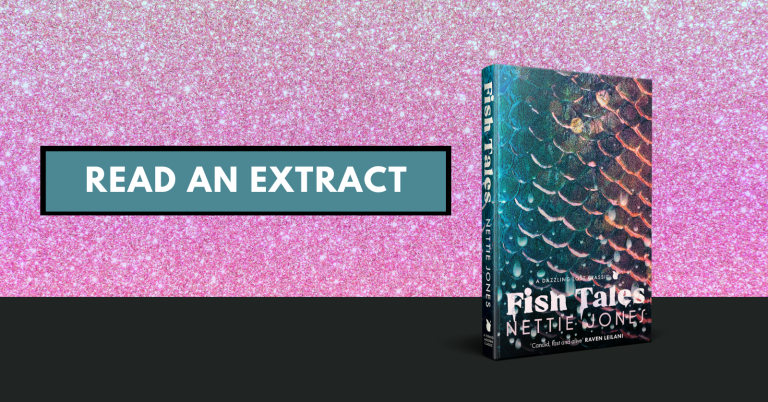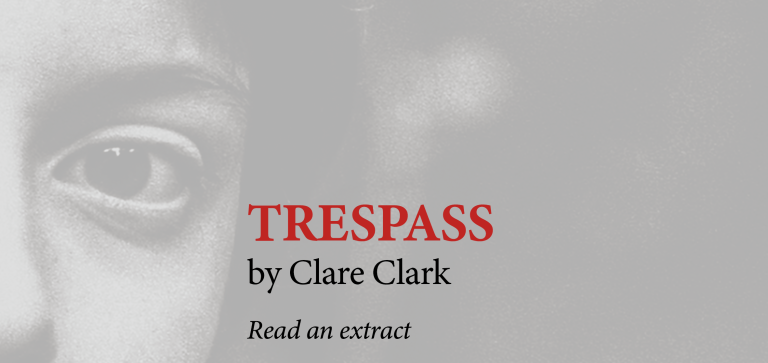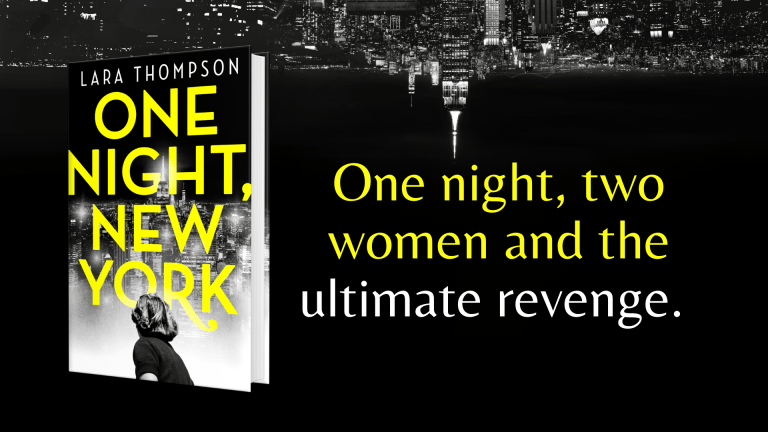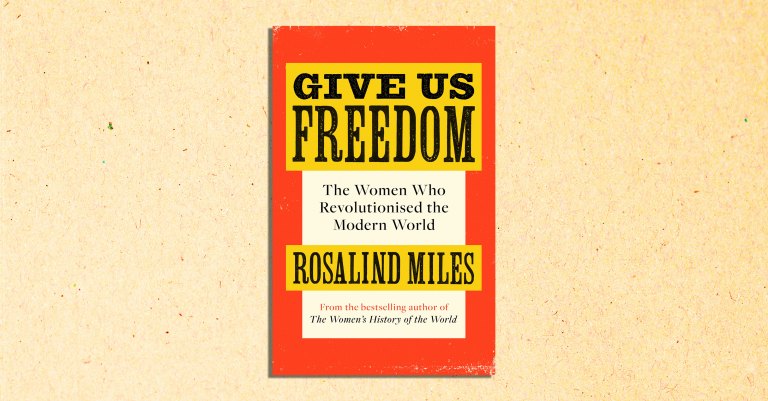Nobody’s Victim Extract
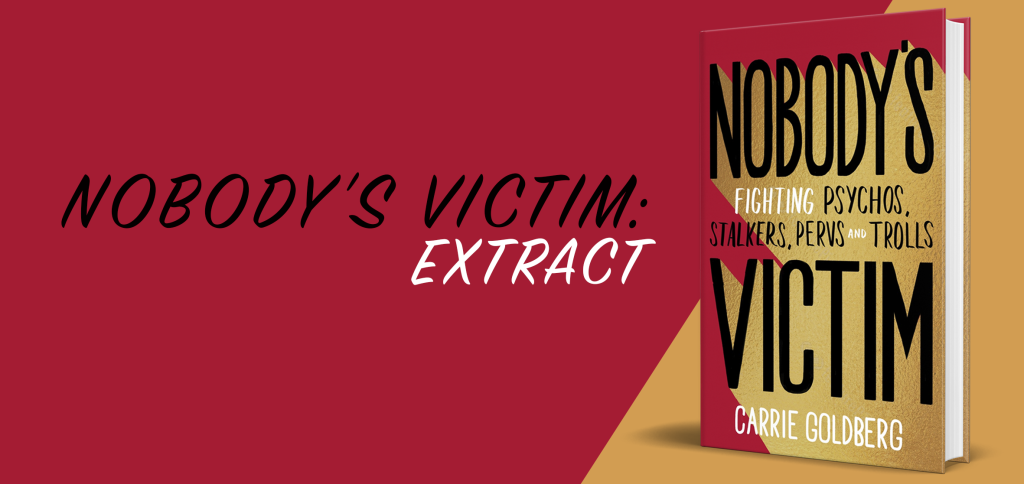
INTRODUCTION
My name is Carrie Goldberg and I’m a victims’ rights lawyer. Some people call me a “passionate advocate” or a “social justice warrior.” I’d rather be called a ruthless motherfucker. I operate my firm, C.A. Goldberg, PLLC, with one fundamental rule: if one of my clients has been harmed, somebody must pay. It’s as simple as that.
My clients—I represent everyone from successful businesspeople to struggling students—have endured unimaginable offenses. They’ve been assaulted, stalked, threatened, raped, and extorted. Their sexual privacy has been invaded, their reputations destroyed, and their lives put in danger. As a result of these crimes, some of my clients have lost their jobs or been forced to leave school, their entire lives and careers upended.
One of my first clients was a seventeen-year-old girl coerced into performing sex acts by a man she’d met online. She was so distraught I worried she might harm herself. Another client was being impersonated online by a vindictive boyfriend who posted multiple Craigslist ads with my client’s phone number and work address promoting her as a sex worker and inviting men over for sex. Yet another client was doxed by an angry mob of trolls who bombarded her with death threats so vicious she fled her home in fear.
Before coming to see me, most of my clients have tried to help themselves. If they are students, they’ve gone to their school officials; if they are being harassed online, they’ve appealed to webmasters and platform administrators. Many have gone to the police—not once but repeatedly. One client sought help more than fifty times before he came to me. I meet people when they are desperate, traumatized, even suicidal, which is exactly what these offenders want. The attacks are meant to crush your soul. I know because it’s happened to me.
I met my psycho ex on the dating site OkCupid. At the time, I was in my midthirties, newly divorced, and living in New York, working as the lead lawyer at the Guardianship Project at the Vera Institute of Justice. My job entailed advocating for mostly indigent, elderly, or mentally disabled adults unable to advocate for themselves and without suitable family to care for them. Courts had deemed our clients legally incapacitated and designated the Vera Institute their court-appointed guardian. I had the sobering responsibility of making decisions about every aspect of my clients’ lives—from money and caretakers to housing and birth control. I didn’t realize at the time how much I longed for someone to take care of me.
When my ex first messaged me, I was immediately intrigued. He was charming, smart, and creative. He’d graduated from the prestigious Wharton business school, he said, and had sometimes commuted there by helicopter. We texted and direct messaged for hours a day, talking about everything: past relationships, his missing turtle, fashion. Our connection was fun, playful, and deeply serious. When we finally met face-to-face, we became instantly inseparable. He chauffeured me around in his Mercedes SUV, bought me jewelry, and commissioned artwork for me—all within the first month. It was romantic and intoxicating. I trusted him with all my secrets. I felt protected and adored.
But then, a few weeks after we started dating, things began to change. He started checking up on me, texting me obsessively whenever I worked late: “Why aren’t you home? Where are you? Who are you with?” Anytime I tried to hang out with friends or talk on the phone with family, he threw a fit. More than once I woke up in the middle of the night and found him sitting straight up, staring at me. He was insanely jealous and would fly into violent rages over imaginary cheating scenarios he refused to believe weren’t true.
One night a friend invited me to a fund-raiser for her new play. The event was held in the basement of a community theater on the Lower East Side where I had no cell reception. Walking out, I checked my phone and saw more than two dozen missed calls from my ex and a string of frantic text messages demanding I respond. He called me a bitch, accused me of cheating on him, proclaimed we were “done,” then insisted I call. He wrote: “Think you can betray me like this? I will fuckin END you.” I was terrified.
I’d like to say I ended things right then. But it took a few months and more frightening incidents before I was finally able to summon the courage to leave the relationship for good. As soon as it was over, my ex started to attack in earnest. He flooded my phone and email with hundreds of threatening messages. He told me he was going to post intimate pictures of me online. He filed a false police report claiming I’d assaulted him. He even contacted my friends, family, and colleagues on Facebook, spreading lies about my having a sexually transmitted infection and being addicted to drugs. He said he hired three HIV-positive men to rape me. He told me this was “war.”
For almost a year, my life was consumed by this battle. I filed a police report, obtained an order of protection, and begged a judge to restrain my ex from posting naked pictures and videos of me online. I spent $30,000 in legal fees and countless hours defending myself against my ex’s false accusations before the charges were eventually dropped. I moved out of the co-op I loved and into an apartment with a doorman. Even then, I didn’t feel safe. Walking down the street, out of the corner of my eye I would catch a glimpse of someone who looked vaguely like my ex and freeze. I thought there was no way I could ever escape his attacks and recover my life.
I was at my lowest point, in December 2013, when a friend invited me to go with her to Ireland, where she’d rented a vacation house. I jumped at the chance to get away. One afternoon we took a ferry to the Aran Islands. During a treacherous storm, I climbed a steep cliff overlooking Galway Bay. As the rain blew sideways, fogging up my glasses, I started replaying moments of what had been the most difficult months of my life. I realized that through it all, the worst part was feeling completely alone. Neither the lawyers nor the judges nor the cops I’d turned to for assistance had ever made me feel protected. Instead, I’d been repeatedly told that there was nothing they could do. Then, standing on that cliff, I had an epiphany: as horrible as my experience had been, I couldn’t possibly be the only one.
There had to be other people out there who had suffered the same kind of attack. It occurred to me that they were probably searching for the same kind of support I had longed for in my darkest days: a skilled fighter who could navigate both the law and the changing digital landscape; someone who understood the threat of privacy violations and knew what to do when a psycho was spinning out of control. In that moment, drenched in the pouring rain, I decided I was going to advocate for victims the way I wish somebody had fought for me. I would become the lawyer I’d needed when I was most desperate.
When I got home, I gave my two weeks’ notice at work. My last day at the Vera Institute was January 23, 2014. I opened my own law firm the next day.
When I started my practice, I had little money, no staff, and zero idea of how to run a business. All I had was the fight. But that was enough. At first, I
took any case I could find and often worked for free. I couldn’t bring myself to say no to people who were in pain the way I’d been, and I wanted to learn how to fight on their behalf. I read everything I could about revenge porn, sextortion, rape, domestic violence, internet law, and First Amendment rights, and I studied state and federal criminal codes. I figured out how to get information removed from the internet, began establishing relationships with people at the major social media companies and search engines, and started working with other survivors, advocates, and lawmakers.
Soon I had more work than I could handle on my own. I hired an intern and then a receptionist. In five years, I grew my firm to a staff of thirteen, including six lawyers. In 2018, I was anointed by Law Firm 500 the fastest-growing law firm in the country.
My clients, many of whom I consider friends, are fierce and fearless warriors. No two are alike. I represent actors and activists, suburban moms, struggling artists, recent immigrants, celebutantes, the superrich—as in own- their- own- jet rich—and folks getting by on food stamps. But while my clients are special and unique, the offenders are not. They are as boring and predictable as they are dangerous.
I’ve spent years studying how the offenders who target my clients operate. I’ve catalogued their grooming and manipulation techniques, their strategies, methods, and intent. There are patterns and similarities in their behaviors that are hard to miss once you know what to look for. My staff and I have even developed a shorthand to describe the shitheads we see most often: psychos, who obsessively stalk, threaten, and intimidate their prey; assholes, who exploit or mistreat victims out of willful ignorance or arrogance or for their own financial gain; trolls, who terrorize victims under the cloak of internet anonymity; and pervs, who get off on overpowering victims into sex acts against their will. Frighteningly, these offenders are all around us, masquerading as regular people, just waiting to attack.
Psychos, pervs, assholes, and trolls hunt for targets on dating apps and social media. They lurk in bars and on college campuses. They teach in our schools, minister in our churches, and hold powerful positions in government, media, and tech. Some of the worst offenders victimize their own spouses and partners. These are the monsters my clients and I battle every day.
Of course, predators, stalkers, and abusers are nothing new. What’s different now is that many of these offenders have harnessed the power and reach of the internet to facilitate their crimes. Armed with nothing but a laptop, and shielded by anonymity, a single bad actor can wreak unmitigated chaos and ruin the lives of countless victims. They stop only when we fight back.
In the first five years of its existence, my firm has secured more than one hundred orders of protection and removed more than 30,000 nonconsensual images and videos from the web. We’ve obtained millions of dollars in financial recoveries for our clients and had more than a dozen offenders arrested and thrown in jail. Working side by side with my clients, I’ve successfully sued major corporations and the mammoth New York City Department of Education.
Along with other advocates, we’ve also pushed for legislative change. Since day one, I’ve been getting in lawmakers’ faces, email blasting, and sending letters and tweets about policy changes we need to implement to keep the public safe. I’ve helped craft more than a dozen states’ revenge-porn laws and spoken at the White House, to Congress, and at think tanks and symposiums across the country.
My firm has made a difference in hundreds of clients’ lives, and impacted countless others who’ve been protected by laws we’ve helped put in place. But I have not been fighting alone. Many of my clients have become powerful warriors in the wake of their attacks. Working with one of my youngest, a sweet girl who was assaulted near her middle school, we sued her entire city. Fighting back is a transformative act.
I’m proud of these victories. But this book is about more than my journey and the harrowing experiences of my clients who’ve agreed to let me share their stories here. This book is a call to arms.
As you will see in these pages, crimes of violence and violation—and the offenders who commit them—are not distinct and unrelated. They are all around us, connected like points on a web. Offenders are everywhere. What makes them so terrifying is that many of these unhinged men—and they are almost always men—are compelled by the same impulses that trigger other offenders to drive cars into groups of protesters and fire assault rifles into churches, synagogues, and schools. They are driven by rage and a thirst to strip victims of their agency and control. These offenders want to dominate, manipulate, and punish their victims. I refuse to let them win. And all of us have the power to fight back. We don’t have to be victims. We can be the army to take these motherfuckers down.
'We need more warriors like Carrie' TARANA BURKE, founder of the MeToo movement
'In the age of doxxing, revenge porn, and misogynist trolls, this book is required reading' ESQUIRE
Nobody's Victim is an unflinching look at a hidden world most people don't know exists-one of stalking, blackmail, and sexual violence, online and off-and the incredible story of how one lawyer, determined to fight back, turned her own hell into a revolution.
Nobody's Victim invites readers to join Carrie Goldberg on the front lines of the war against sexual violence and privacy violations as her law firm sues the hell out of tech companies, schools, and sexual predators. Her battleground is the courtroom; her crusade is to transform clients from victims into warriors.
In gripping detail, Carrie shares the diabolical ways her clients are attacked and how she, through her unique combination of relentless advocacy, badass risk-taking, and unique client-empowerment, pursues justice for them all. There is the ex-boyfriend who made fake bomb threats in a client's name, causing a national panic; the girl who was sexually assaulted on school grounds and then suspended when she reported the attack; and the guy who used a dating app to send more than 1,200 men to his ex's home and office for sex. Carrie also shares her own shattering story about why she began her work and became the lawyer she needed.
Riveting and essential, Nobody's Victim is a bold and timely analysis of victim protection in the era of the Internet. This book is an urgent warning of a coming crisis, a predictor of imminent danger, and a weapon to take back control and protect ourselves-both online and off.
'A rallying cry for privacy justice . . . chilling . . . take-no-prisoners and warmly gregarious' New York Times
*Perfect for fans of She Said by Jodi Kantor and Megan Twohey, The Whisper Network by Chandler Baker and The Good Fight*

